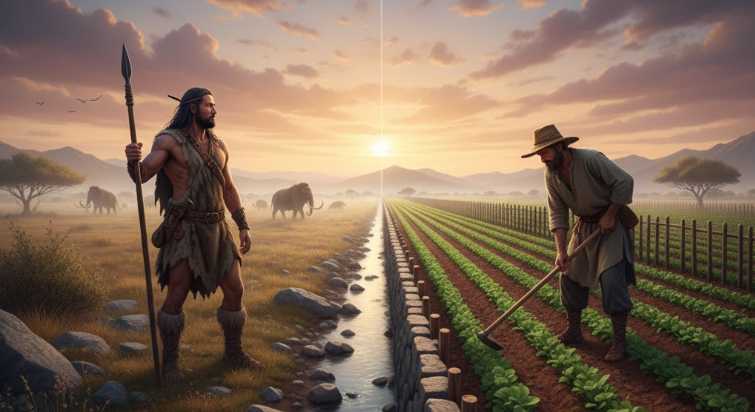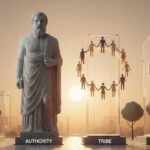I’ve been reading Sapiens: A Brief History of Humankind by Yuval Noah Harari. It’s not a business book, but it might be one of the most revealing studies of human nature I’ve ever read. One section stopped me cold: the Agricultural Revolution.
The author describes how humans traded freedom for stability, and how that trade reshaped our species. People began farming for a more predictable life, but what they got was longer hours, worse nutrition, more disease, and less freedom. That story sounded uncomfortably familiar because the same thing happens to entrepreneurs today.
We start our businesses as hunters, free, curious, and flexible, but the moment we chase stability or scale, we become farmers. We build systems, specialize, settle in, and slowly trade away the very freedom that made us start in the first place.
Hunters vs. Farmers: The First Business Models
Before farming, humans lived like true entrepreneurs. They followed any opportunity. They adapted fast. They understood risk because survival depended on it.
Hunter-gatherers didn’t “own” much, but they possessed something more valuable: mobility. If the animal herd moved or the climate shifted, they would pack up and follow. Everyone knew enough to survive. They were generalists, jacks of all trades, masters of none, and that broad skill set made them resilient.
Farming flipped the script. You couldn’t chase opportunity anymore; you had to stay and protect what you had built. You became dependent on the weather, the soil, and the harvest. Over time, people specialized. One person grew wheat, another raised livestock, and another built tools. Productivity went up, but adaptability went down.
That was humanity’s first version of specialization and the first time people became slaves to their own systems.
In business terms:
- Hunters are solopreneurs, freelancers, and micro-enterprises, characterized by their mobility, creativity, and adaptability.
- Farmers are employees or large organizations, characterized by their structure, specialization, and risk aversion.
The larger the business, the more farming it requires.
Related Post: How To Know If You Are a Hunter or Farmer Entrepreneur?
What the First Farmers Lost
The shift to agriculture looked like progress, but it came at a cost our ancestors didn’t fully grasp.
- They worked harder—sunrise to sunset, tied to their land.
- They ate worse—grain-heavy diets that lacked key nutrients.
- They got sicker—disease spread easily in dense communities.
- They lost adaptability—they couldn’t migrate when conditions changed.
- They became dependent—on weather, seasons, and each other’s specialized roles.
And once those farming communities grew large enough, there was no going back. They couldn’t revert to hunting and gathering, even if they wanted to. The trap had closed.
That’s not ancient history. The same thing happens today when entrepreneurs or employees get locked into systems that no longer serve them. They can see the tradeoff, but they just can’t undo it.
The Modern Farmer’s Trap
Fast-forward a few thousand years. Today’s “farmers” aren’t tending fields; they’re tending careers, corporations, and overly complicated businesses. They trade freedom for predictability, often without realizing it.
The corporate employee is the most obvious example. A steady paycheck replaces the harvest. Promotions replace planting season. Each person specializes in a narrow skill, optimized for efficiency but stripped of autonomy.
But entrepreneurs fall into the same trap when they scale. They build systems for control, employees, processes, debt, and layers of management. Soon, they’re no longer running a business; the business is running them. They’ve built a farm.
The Seduction of Stability
Stability is seductive because it feels safe. But it’s the same illusion that drew early farmers into the fields. They thought they were gaining control over nature, but in reality, they became its servants. They had to stay near their crops, defend their land, and pray for good weather. Freedom disappeared in exchange for the promise of predictability.
Modern entrepreneurs do the same thing when they chase comfort over curiosity. We lock ourselves into business models that feel stable: subscriptions, contracts, repeatable systems, but every layer of stability adds a layer of dependency.
That’s the irony of “security.” The more you try to control, the less flexible you become when the world changes. True freedom doesn’t come from control. It comes from adaptability.
The Growth Trap
The Agricultural Revolution increased productivity but didn’t improve the quality of life for the farmer. Farmers produced more food but were less healthy, less happy, and more overworked.
That’s exactly how business growth works when it’s not guided by purpose. Revenue goes up, but stress goes up faster. Complexity expands until your days are filled with managing people, not creating value. You build systems that you can’t easily escape.
I’ve seen it hundreds of times. Founders grow their companies beyond what brings them joy, thinking that scale equals success. However, the larger the operation, the more it resembles employment, albeit with more responsibility and less downtime.
Growth is good, but only if it enhances your freedom. When it doesn’t, it’s just another form of enslavement.
The Lesson in Regret
The first farmers probably believed they were building a better life. They had homes, tools, and food storage. But if they could’ve seen what they lost, such as: mobility, variety, health, and time, they might have chosen differently.
That’s the lesson in regret: once you trade freedom for security, it’s hard to get it back.
Many entrepreneurs feel that same regret. They start with independence and end up trapped by the very systems they built. They can’t scale down, can’t take a break, and can’t remember why they started in the first place.
I know that feeling firsthand.
My Own Epiphany
After I sold my first company, I stayed on with the publicly held firm that bought it. On paper, it was progress: more resources, reputation, and reach. But something inside me shifted. The energy that had once come from creation now got buried under process and politics. Every decision required a meeting. Every action needed a policy.
It felt safe, but it didn’t feel right. At the time, I couldn’t explain why. I just knew I felt smaller inside a bigger system.
When the chance came to buy back my old business, I leapt at it. I didn’t need to analyze the numbers; I could feel it in my bones.
Reading Sapiens finally gave me the words for that experience. I had gone from hunter to farmer. Selling the business made me part of someone else’s field. Buying it back made me free again. I stopped farming and resumed hunting.
Why the Hunter-Gatherer Mindset Still Wins
Hunter-gatherers thrived because they were flexible. They could read their environment, move when needed, and try new strategies without massive infrastructure weighing them down. They didn’t hoard or over-specialize. They learned broadly and adapted constantly. That’s exactly what allows small business owners, solopreneurs, and freelancers to thrive today.
The hunter-gatherer mindset wins because it’s built for uncertainty.
Here’s what that looks like in modern business:
- Mobility over permanence: Hunters moved with the herds. Entrepreneurs pivot with the market.
- Diversity over dependence: Hunters ate what nature offered. Smart businesses keep multiple revenue streams.
- Knowledge over specialization: Hunters knew a little about everything. Entrepreneurs who stay hands-on understand every part of their business.
- Adaptability over control: Hunters read the signs and reacted fast. Entrepreneurs must do the same with technology, demand, and competition.
- Freedom over comfort: Hunters valued flexibility more than stability. Entrepreneurs should, too.
Big companies are efficient, but small ones are reactive. Hunters can reinvent themselves overnight. Farmers need a season, and sometimes a lifetime, to change course.
Freedom as the Real Metric
We are told success is measured in dollars, headcount, and followers. But those are farming metrics. The hunter measures success in freedom, the ability to move, to choose, or adapt.
Ask yourself:
- Can you act on a new opportunity when it appears?
- Can you adjust your course when the market or technology shifts?
- Do you still feel curiosity, or only obligation?
If your answers lean toward no, you’re farming, not hunting. Freedom—not size—is the truest measure of entrepreneurial success.
The Modern Farmer’s Regret
Walk through any corporate office and you’ll find modern farmers, professionals who’ve traded creativity for consistency, autonomy for stability. They clock in, specialize, and protect what they’ve built, even when it no longer serves them. They’re good at tending the field but disconnected from the thrill of the hunt.
Many entrepreneurs who scale their businesses end up in the same place. They hit the growth target, built the big company, and then quietly realized they missed the early days; the chase, the problem-solving, the sense of creation.
That’s not nostalgia. It’s instinct. Our DNA still remembers what it felt like to be free.
How to Stay a Hunter in a Farmer’s World
- Stay light: Every fixed cost is a root in the ground. The more you own, the harder it is to move. Keep your operations lean.
- Diversify: Farmers depended on a single crop; hunters ate whatever they found. Don’t bet your business on one client, product, or channel.
- Keep learning: Curiosity is the hunter’s survival skill. The moment you stop learning, you start farming.
- Work for freedom, not scale: Bigger isn’t always better. Define what “enough” looks like and build a business that serves it.
- Embrace uncertainty: The unknown isn’t the enemy, it’s the territory of opportunity. Hunters knew that. So should we.
The Microenterprise Advantage
Solopreneurs, microbusinesses, and lifestyle companies still live close to the spirit of the hunter-gatherer. They’re small enough to pivot, personal enough to care, and agile enough to thrive in chaos.
That’s why I’ve always focused my energy there. Microenterprises represent the purest form of entrepreneurship: the creative tension between risk and reward, independence and responsibility.
Everyone says they want to scale, but scaling often means giving up what you love most. The freedom to choose your clients. The ability to experiment. The satisfaction of seeing direct cause and effect between your effort and your results.
When you’re small, you’re free to roam. When you’re big, you’re bound to the field.
Closing Reflection: The Freedom to Hunt
The Agricultural Revolution gave humans comfort but cost them freedom. And we’ve been wrestling with that tradeoff ever since.
Business is no different. Every system we build, be it corporate or personal, risks turning us into farmers.
But the hunter-gatherer mindset still wins. It rewards curiosity, creativity, and movement. It keeps us alert, alive, and adaptable. It reminds us that security is an illusion and that real prosperity comes from flexibility, not control.
When I think back on my own journey: building, selling, scaling, then shrinking again, I see it clearly now. The best thing I ever did was go small. I stopped farming and started hunting again. And I’ve never felt freer.
So before you chase the next stage of growth, ask yourself: Will this give me more freedom or just more fields to tend? The hunter already knows the answer.
Where on the continuum do you want your business to fall? On the hunter-gatherer end or as a farmer?












